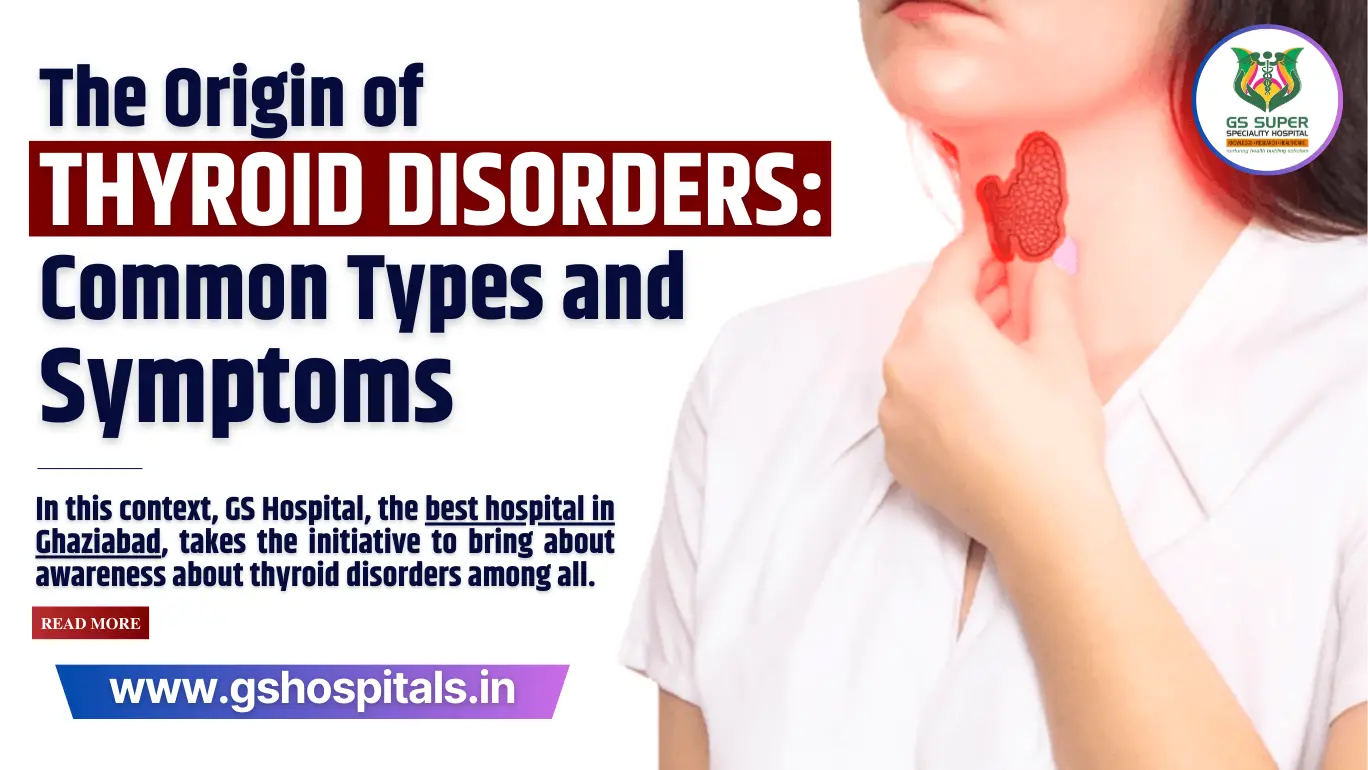Thyroid disorders are very common these days. Moreover, it is commonly seen in women and its incidence is on high rise mainly due to hormonal imbalance. Yes! You got that right. Women are more prone to hormonal imbalances and endocrinology disorders. In this context, GS Hospital, the best hospital in Ghaziabad, takes the initiative to bring about awareness about thyroid disorders among all. This hospital is one of the Top ENT hospitals in Ghaziabad known for its thyroid treatment and cure with a great success rate.
In this blog, we have rounded up top expertise on thyroid from the best general physicians at Ghaziabad to spread the word of thought on living with thyroid disorders. Let us take a deep dive into the origin of thyroid disorders, common types of thyroid problems, their symptoms, and solutions.

The majority of us get dreaded when we are informed about thyroid disorders. The first thing that comes to our mind in case of thyroid issues is long-term thyroid medications which are to be taken all our life. But, Fret Not! These so-called “thyroid medications” are nothing but thyroid supplements that are provided externally to the patients to boost thyroid functioning. Let us take a sneak peek into the thyroid gland structure and its function.
Anatomically speaking, the thyroid is a butterfly-shaped gland that is located at the base of the neck and is easily palpable. It is located in front of the neck, wrapped around the windpipe. It has two butterfly-shaped wings extended to the right and left of the throat.
This thyroid gland is regulated by the pituitary gland (located in the brain) which stimulates the release of T3 and T4 hormones to regulate metabolism. The pituitary gland releases the thyroid stimulating hormone, often known as TSH, which is one of the parameters of the thyroid profile.
Most of the thyroid patients agree with the fluctuating TSH levels in their reports. Excited to know more? Well, let us get into the functions of the thyroid. Stay tuned until the end of the article to discover some amazing lifestyle solutions naturally by boosting the thyroid for weight loss.
You got that right! The functions of the thyroid gland are as follows:
Thyroid disorder is a medical term given to fluctuations in the TSH levels, T3 levels, and T4 levels which impacts the functioning of the thyroid gland and creates havoc in the endocrine systems. Even if one hormone such as stress hormone goes for the toss, the entire hormonal cycle may get affected. These causes have a direct impact on the sex hormones, sleep hormones, skin hormones, gastric hormones, appetite hormones, happy hormones, and so on.
Yes, thyroid disorder can affect multiple systems causing comorbidities. Let us take a look into the types of thyroid disorders in the next part of the article.
Wondering what causes thyroid disorders? Let us check it in the next part of the article.
Hypothyroidism as the name suggests occurs when there is underactivity of the thyroid gland. This causes a spike in TSH levels and the thyroid gland responds slowly. In such cases, the activity of the entire body is very slow causing the following symptoms:
Hyperthyroidism as the name suggests occurs when there is overactivity of the thyroid gland. This causes a dip in TSH levels and the thyroid gland responds at a faster pace. In such cases, the activity of the entire body is very fast causing the following symptoms:
Thyroiditis occurs due to inflammation or swelling of thyroid glands. This is mainly due to attacks on thyroid cells caused by auto-immune disorder. It may be recurrent and for a short span of 1-3 months. Thyroiditis may be drug-induced, or due to acute infections preceded by respiratory tract infection causing painful swelling of the thyroid gland.
Hashimoto’s thyroiditis is an auto-immune disorder due to inflammation and swelling of thyroid glands which is generally painless. This causes hypothyroidism and underactivity of the thyroid gland. It is also called autoimmune thyroiditis.
Graves’s disease as the name suggests occurs due to overproduction of thyroid hormones which causes diffuse toxic goiter and enlarged thyroid gland. The symptoms of the Grave’s disease are as follows:
Thyroid nodules are usually a sign of overactive thyroid or hyperthyroidism. This results in the formation of a single toxic nodular or multinodular goiter.
Postpartum Thyroiditis occurs in women after childbirth in the postpartum phase. This generally leads to obesity and associated postpartum depression.
Neonatal thyroid disorder is considered a rare disorder in which newborns are born with a non-functioning thyroid gland where thyroid activity is absent. This may lead to future complications if left untreated. Newborns need to undergo thyroid screening tests at birth.
The causes of thyroid disorders are:
It is important to know about the causes of thyroid disorders. Eliminating the causes of thyroid disorders can help in reducing the intensity of the problem. Along with treatment, lifestyle changes are a must to eliminate thyroid issues.
Thyroid patients find it quite difficult to lose weight. This leads to multiple problems such as hypertension, high cholesterol, and diabetes. Blood sugar levels, blood pressure levels, and cholesterol problems are important parameters for cardiac health. Thyroid problems may directly or indirectly impact cardiac health issues. It will also cause fertility issues like PCOD and other problems.
Maintaining a healthy lifestyle is a must for proper functioning of the thyroid gland and keeping thyroid problems at bay. Just simply keeping fit and following weight management with thyroid medications can work wonders to help recover from thyroid.